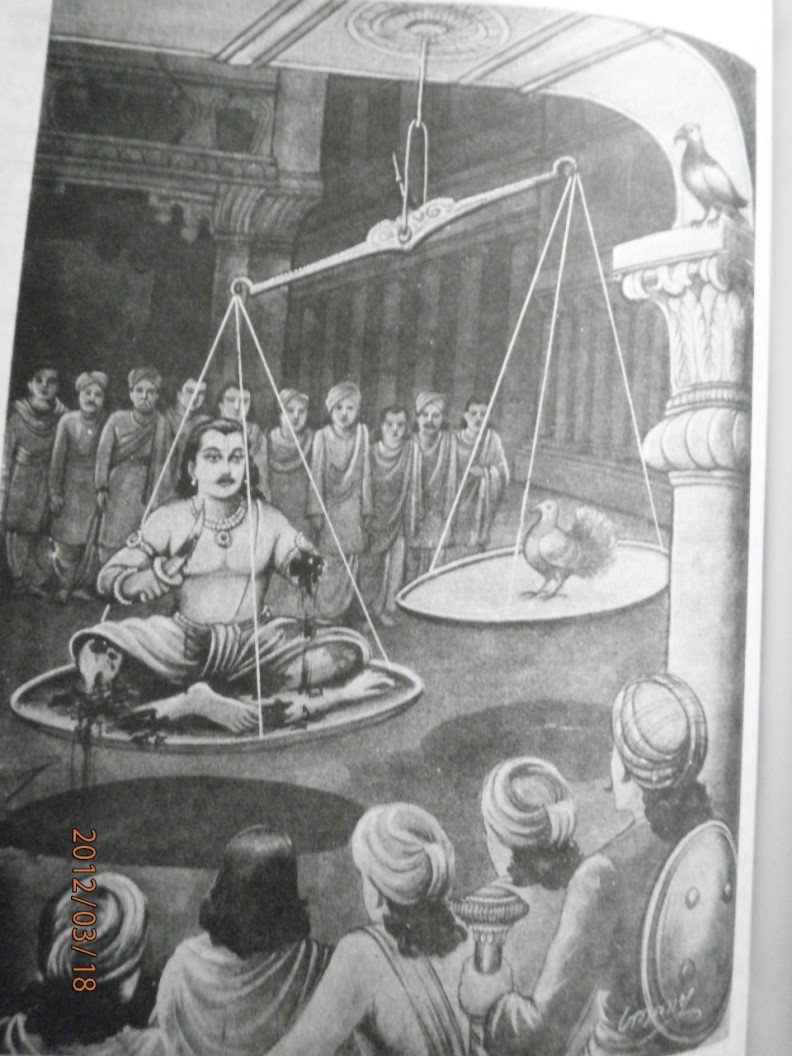Ushinara
Desirous of testing Ushinara's merit and also of bestowing boons on him, Indra and Agni presented themselves at his sacrificial ground. Indra assuming the shape of a hawk, and Agni that of a pigeon, came up to that king. The pigeon in fear of the hawk, fell upon the king's thigh, seeking his protection.
The hawk said, “All the kings of the earth represent you as a pious ruler. Wherefore, O prince! have you then stopped to perpetrate a deed not sanctioned by the ordinance? I have been sore afflicted with hunger. Do you not withhold from me that which has been appointed by the Deity for my food, under the impression that thereby you serve the interests of virtue, whereas in reality, you will forsake it.
Thereupon, the king said, “O best of the feathered race! Afflicted with fear of you, and desirous of escaping from your hands, this bird, all in a hurry, has come up to me asking for life. When this pigeon has in such a manner sought my protection, why do you not see that the highest merit is even in my not surrendering it unto you? It is trembling with fear, and is agitated, and is seeking its life from me. It is therefore certainly blameworthy to forsake it. He that slays a Brahmana, he that slaughtered a cow, the common mother of all the worlds, and he that forsake one seeking for protection are equally sinful.”
Thereat the hawk replied, “O lord of earth! It is from food that all beings derive their life, and it is food also that nourishs and sustains them. A man can live long even after forsaking what is dearest to him, but he cannot do so, after abstaining from food. Being deprived of food, my life will surely leave this body, and will attain to regions unknown to such troubles. But at my death, my wife and children will surely perish, and by protecting this single pigeon, you do not protect many lives. The virtue that stands in the way of another virtue, is certainly no virtue at all, but in reality is unrighteousness. But, whose prowess consists in truth, that virtue is worthy of the name, which is not conflicting. After instituting a comparison between opposing virtues, and weighing their comparative merits, one ought to espouse that which is not opposing. Do you, therefore, striking a balance between virtues, adopt that which preponderates.”
At this the king said, “O best of birds! As you speak words fraught with much good, I suspect you to be Suparna, the monarch of birds. I have not the least hesitation to declare that you are fully conversant with the ways of virtue. As you speak wonders about virtue, I think that there is nothing connected with it, that is unknown to you. How can you then consider the forsaking of one, seeking for help, as virtuous? Your efforts in this matter have been in quest of food. You can, however, appease your hunger with some other sort of food, even more copious. I am perfectly willing to procure for you any sort of food that to you may seem most tasteful, even if it be an ox, or a boar, or a deer, or a buffalo.”
Thereupon the hawk said, “O great king! I am not desirous of eating a boar or an ox or the various species of beasts. What have I to do with any other sort of food? Therefore, leave to me this pigeon, whom Heaven has today ordained for my food, that hawks eat pigeons is the eternal provision. Do not for support embrace a plantain tree, not knowing its want of strength.”
The king said, “Ranger of the skies! I am willing to bestow on you this rich province of my race, or any other thing that you may seem desirable. With the sole exception of this pigeon, which has approached me craving my protection, I shall be glad to give unto you anything that you may like. Let me know what I shall have to do for the deliverance of this bird. But this I shall not return to you on any condition whatever.”
The hawk said, “O great ruler of men! If you have conceived an affection for this pigeon, then cut off a portion of your own flesh, and weigh it in a balance, against this pigeon. When you have found it equal in weight to the pigeon, then you give it unto me, and that will be to my satisfaction.”
Then the king replied, “This request of yours, O hawk! I consider as a favour unto me, and, therefore, I will give unto you even my own flesh, after weighing it in a balance.”
Saying this, the highly virtuous king cut off a portion of his own flesh, and placed it in a balance, against the pigeon. But when he found that pigeon exceeded his flesh in weight, he once more cut off another portion of his flesh, and added it to the former. When portion after portion had been repeatedly added to weigh against the pigeon, and no more flesh was left on his body, he mounted the scale himself, utterly devoid of flesh.
The hawk then said, “I am Indra, O virtuous king! and this pigeon is Agni, the carrier of the sacrificial clarified butter. We had come unto your sacrificial ground, desirous of testing your merit. Since you have cut off your own flesh from your body, your glory shall be resplendent, and shall surpass that of all others in the world. As long as men shall speak of you, so long shall your glory endure, and you shall inhabit the holy regions.”
Saying this to the king, Indra ascended to heaven. King Ushinara, after having filled heaven and earth with the merit of his pious deeds, ascended to heaven in a radiant shape.
